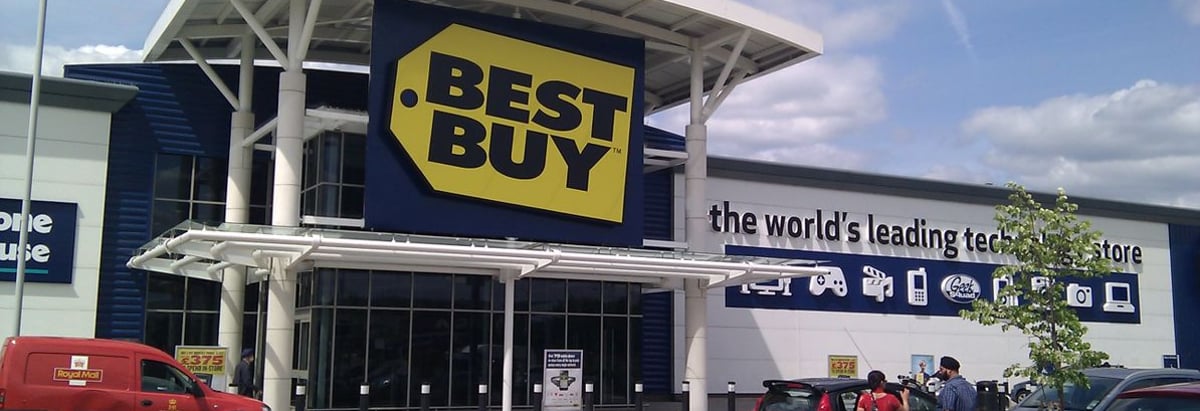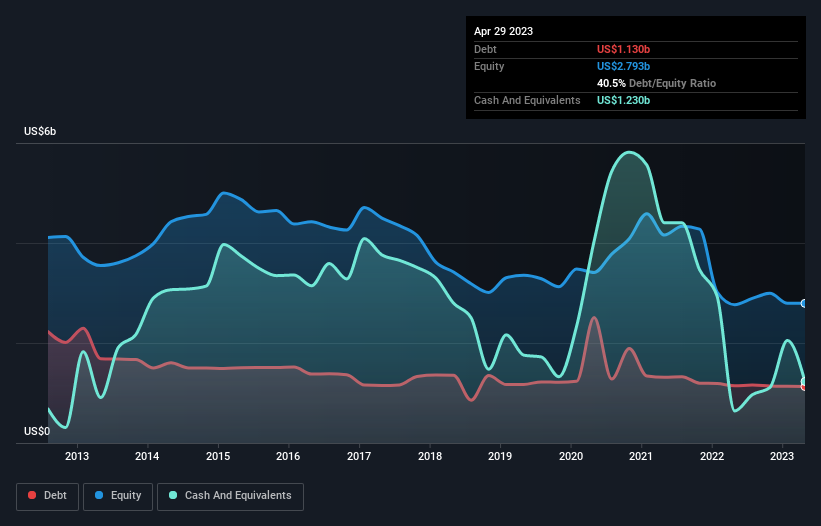
Legendary fund manager Li Lu (who Charlie Munger backed) once said, 'The biggest investment risk is not the volatility of prices, but whether you will suffer a permanent loss of capital.' When we think about how risky a company is, we always like to look at its use of debt, since debt overload can lead to ruin. We can see that Best Buy Co., Inc. (NYSE:BBY) does use debt in its business. But the real question is whether this debt is making the company risky.
What Risk Does Debt Bring?
Debt and other liabilities become risky for a business when it cannot easily fulfill those obligations, either with free cash flow or by raising capital at an attractive price. If things get really bad, the lenders can take control of the business. However, a more usual (but still expensive) situation is where a company must dilute shareholders at a cheap share price simply to get debt under control. Of course, plenty of companies use debt to fund growth, without any negative consequences. When we examine debt levels, we first consider both cash and debt levels, together.
View our latest analysis for Best Buy
What Is Best Buy's Debt?
The chart below, which you can click on for greater detail, shows that Best Buy had US$1.13b in debt in April 2023; about the same as the year before. But on the other hand it also has US$1.23b in cash, leading to a US$100.0m net cash position.

A Look At Best Buy's Liabilities
According to the last reported balance sheet, Best Buy had liabilities of US$7.91b due within 12 months, and liabilities of US$3.99b due beyond 12 months. Offsetting these obligations, it had cash of US$1.23b as well as receivables valued at US$860.0m due within 12 months. So its liabilities total US$9.81b more than the combination of its cash and short-term receivables.
This deficit is considerable relative to its very significant market capitalization of US$16.2b, so it does suggest shareholders should keep an eye on Best Buy's use of debt. Should its lenders demand that it shore up the balance sheet, shareholders would likely face severe dilution. Despite its noteworthy liabilities, Best Buy boasts net cash, so it's fair to say it does not have a heavy debt load!
In fact Best Buy's saving grace is its low debt levels, because its EBIT has tanked 35% in the last twelve months. When it comes to paying off debt, falling earnings are no more useful than sugary sodas are for your health. There's no doubt that we learn most about debt from the balance sheet. But ultimately the future profitability of the business will decide if Best Buy can strengthen its balance sheet over time. So if you want to see what the professionals think, you might find this free report on analyst profit forecasts to be interesting.
Finally, a business needs free cash flow to pay off debt; accounting profits just don't cut it. While Best Buy has net cash on its balance sheet, it's still worth taking a look at its ability to convert earnings before interest and tax (EBIT) to free cash flow, to help us understand how quickly it is building (or eroding) that cash balance. During the last three years, Best Buy generated free cash flow amounting to a very robust 85% of its EBIT, more than we'd expect. That puts it in a very strong position to pay down debt.
Summing Up
While Best Buy does have more liabilities than liquid assets, it also has net cash of US$100.0m. The cherry on top was that in converted 85% of that EBIT to free cash flow, bringing in US$2.0b. So we are not troubled with Best Buy's debt use. When analysing debt levels, the balance sheet is the obvious place to start. But ultimately, every company can contain risks that exist outside of the balance sheet. For instance, we've identified 2 warning signs for Best Buy that you should be aware of.
Of course, if you're the type of investor who prefers buying stocks without the burden of debt, then don't hesitate to discover our exclusive list of net cash growth stocks, today.
Valuation is complex, but we're here to simplify it.
Discover if Best Buy might be undervalued or overvalued with our detailed analysis, featuring fair value estimates, potential risks, dividends, insider trades, and its financial condition.
Access Free AnalysisHave feedback on this article? Concerned about the content? Get in touch with us directly. Alternatively, email editorial-team (at) simplywallst.com.
This article by Simply Wall St is general in nature. We provide commentary based on historical data and analyst forecasts only using an unbiased methodology and our articles are not intended to be financial advice. It does not constitute a recommendation to buy or sell any stock, and does not take account of your objectives, or your financial situation. We aim to bring you long-term focused analysis driven by fundamental data. Note that our analysis may not factor in the latest price-sensitive company announcements or qualitative material. Simply Wall St has no position in any stocks mentioned.
About NYSE:BBY
Best Buy
Engages in the retail of technology products in the United States, Canada, and international.
Very undervalued with flawless balance sheet and pays a dividend.

